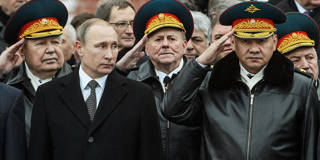As war fever returns in Ukraine, the question of why Russian President Vladimir Putin went from would-be modernizer to aggressive autocrat is being revived. Whatever the reason – fear for his safety, a sense of historical grievance, or both – Putin’s inability to reform Russia’s economy seems certain to be his downfall.
WASHINGTON, DC – Russian President Vladimir Putin has at times garnered as much attention in the US presidential campaign as Hillary Clinton and Donald Trump. By having his minions hack into Democratic Party computers and pass the results to WikiLeaks, as credible security experts believe, Putin appeared to be trying to tilt the election Trump’s way. And Trump, besides calling on Russia to hack Clinton emails, seems to have returned the favor by accepting Putin’s reasons for annexing Crimea and denying the presence of Russian troops in eastern Ukraine. In Putin, many observers see Trump’s ideal of leadership: autocratic, unconstrained, and very idiosyncratic.
Back in Russia, Putin outdoes even Trump in dominating the news. Of course, he has the Kremlin’s mighty propaganda machine at his fingertips, one that ceaselessly projects his image as an omniscient, omnipotent Czar in a new-model televised cult of personality. Yet despite the presence of this wise Czar, Russia’s economy has nearly imploded, and appears on course for Leonid Brezhnev-style stagnation, if not worse.
Given his record of international adventurism and economic bungling, it is no surprise that Putin has fascinated, and appalled, Project Syndicate commentators for the 16 years of his rule. Ivan Krastev of the Center for Liberal Strategies in Sofia, may capture their point of view best: we are fascinated by Russia’s president “not because Putin is right, or even because he is stronger, but because he is taking the initiative,” while leaders in the West seem too timid and/or paralyzed to act.

WASHINGTON, DC – Russian President Vladimir Putin has at times garnered as much attention in the US presidential campaign as Hillary Clinton and Donald Trump. By having his minions hack into Democratic Party computers and pass the results to WikiLeaks, as credible security experts believe, Putin appeared to be trying to tilt the election Trump’s way. And Trump, besides calling on Russia to hack Clinton emails, seems to have returned the favor by accepting Putin’s reasons for annexing Crimea and denying the presence of Russian troops in eastern Ukraine. In Putin, many observers see Trump’s ideal of leadership: autocratic, unconstrained, and very idiosyncratic.
Back in Russia, Putin outdoes even Trump in dominating the news. Of course, he has the Kremlin’s mighty propaganda machine at his fingertips, one that ceaselessly projects his image as an omniscient, omnipotent Czar in a new-model televised cult of personality. Yet despite the presence of this wise Czar, Russia’s economy has nearly imploded, and appears on course for Leonid Brezhnev-style stagnation, if not worse.
Given his record of international adventurism and economic bungling, it is no surprise that Putin has fascinated, and appalled, Project Syndicate commentators for the 16 years of his rule. Ivan Krastev of the Center for Liberal Strategies in Sofia, may capture their point of view best: we are fascinated by Russia’s president “not because Putin is right, or even because he is stronger, but because he is taking the initiative,” while leaders in the West seem too timid and/or paralyzed to act.